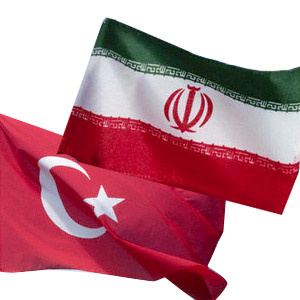Reaping Our Fruit
Turkey enjoying the position that Iran deserves. By Bahram Amir Ahmadian

These days, Iran-Turkey relations have turned into a paragon of fruitful regional cooperation in Middle East. However, an in-depth look may reveal the lesser seen aspects of this relations for us. When it comes to the benefits of this mutual relation, it seems that the balance tilts towards Turkey. Europe’s easternmost country is doing as best as it can to use the opportunities Iran creates, including the merits of hosting a transit route for Iran’s energy to Europe.
In fact, Turkey’s strategy has been to play an active role in every regional development, and at any level possible. Within the framework of this strategy, being friends with Iran would indeed benefit Turkey. In its ‘turn towards East policy’ Turkey tries to improve its Middle East position, may to prove Europe its regional influence that could lead to its membership in the EU. Turkey could be the bridge between West and the Middle East.
Such efforts may be good news for the Turks but not for Iranians. A closer look reveals that Turkey is trying to gain the position that in fact belongs to Iran. In other words, Turkey is picking Iran’s fruits. In a clever game, Turkey has re-established diplomatic ties with Armenia while keeping the Republic of Azerbaijan economically dependent. Turkey has also shown that with a population as large as that of Iran, and lacking energy resources, its GDP could be as three times as that of Iran. Recently, there have been rumors around that Iran could transfer its uranium to Turkey instead of Russia. Nevertheless, Turkey seems to lack the nuclear technology required to cooperate with Iran in the uranium enrichment process. This could be another game well played by shrewd Turks, another effort to mediate between struggling parties.
Turkey’s geopolitical position has provided it with the chance to become a bridge. While a member of the Black Sea Economic Cooperation organization (BSEC), Turkey is active in the regional cooperation organization of Mediterranean littoral states. It is also a key member of the Organization of Islamic Conference (OIC). A coherent domestic policy and constructive foreign diplomacy have upgraded the Turks to this position.
However, Turks have repeatedly denied interest in brokering reconciliation between Iran and West. Iran views Turkey as a Muslim country, an OIC member and a constituent of the ECO. Turkey’s intermediation would draw Iran’s brows together Iran and Turkey would not want that to happen when the total volume of trade exchanges between the two countries has become 20-fold within the past thirty years.
Iran could also rep benefits from cooperation with its northwestern neighbor. Turkey’s membership in the EU would be definitely good news for Iran; however, to gain more from bilateral ties Tehran needs a coherent domestic policy in which all national forces cooperate. That is how we can interact with the international community.
In fact, Turkey’s strategy has been to play an active role in every regional development, and at any level possible. Within the framework of this strategy, being friends with Iran would indeed benefit Turkey. In its ‘turn towards East policy’ Turkey tries to improve its Middle East position, may to prove Europe its regional influence that could lead to its membership in the EU. Turkey could be the bridge between West and the Middle East.
Such efforts may be good news for the Turks but not for Iranians. A closer look reveals that Turkey is trying to gain the position that in fact belongs to Iran. In other words, Turkey is picking Iran’s fruits. In a clever game, Turkey has re-established diplomatic ties with Armenia while keeping the Republic of Azerbaijan economically dependent. Turkey has also shown that with a population as large as that of Iran, and lacking energy resources, its GDP could be as three times as that of Iran. Recently, there have been rumors around that Iran could transfer its uranium to Turkey instead of Russia. Nevertheless, Turkey seems to lack the nuclear technology required to cooperate with Iran in the uranium enrichment process. This could be another game well played by shrewd Turks, another effort to mediate between struggling parties.
Turkey’s geopolitical position has provided it with the chance to become a bridge. While a member of the Black Sea Economic Cooperation organization (BSEC), Turkey is active in the regional cooperation organization of Mediterranean littoral states. It is also a key member of the Organization of Islamic Conference (OIC). A coherent domestic policy and constructive foreign diplomacy have upgraded the Turks to this position.
However, Turks have repeatedly denied interest in brokering reconciliation between Iran and West. Iran views Turkey as a Muslim country, an OIC member and a constituent of the ECO. Turkey’s intermediation would draw Iran’s brows together Iran and Turkey would not want that to happen when the total volume of trade exchanges between the two countries has become 20-fold within the past thirty years.
Iran could also rep benefits from cooperation with its northwestern neighbor. Turkey’s membership in the EU would be definitely good news for Iran; however, to gain more from bilateral ties Tehran needs a coherent domestic policy in which all national forces cooperate. That is how we can interact with the international community.

